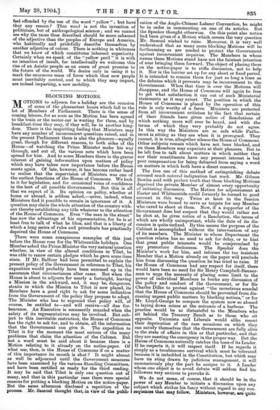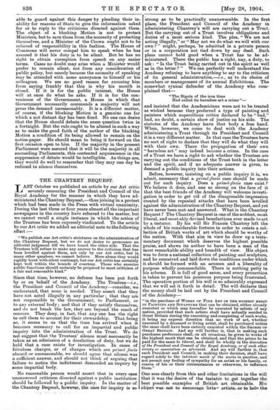BLOCKING MOTIONS.
NOTIONS to adjourn for a holiday are the occasion of some of the pleasantest hours which fall to the lot of Members of Parliament. There is the sense of coming leisure, for as soon as the Motion has been agreed to the train or the motor-car is waiting for them, and by breakfast-time they may, if they will, be in another king- dom. There is the inspiriting feeling that Ministers may have any number of inconvenient questions raised, and in the present Parliament there is also the pleasure—equally great, though for different reasons, to both sides of the House—of watching the Prime Minister make his way through, and out of, the various nets which have been spread for him. And to some Members there is the graver interest of gaining information upon matters of policy which may have taken new importance before the House meets again. Of late, however, it has become rather hard to realise that the supervision of Ministers was one of the earliest functions of the House of Commons. We look to it for legislation, and for occasional votes of confidence in the best of all possible Governments. But this is all that we expect of it. Its opinion on policy, whether at home or abroad, is seldom asked,—never, indeed, when Ministers find it possible to remain in ignorance of it. A question may claim the whole attention of the country with- out thereby establishing any title whatever to the attention of the House of Commons. Even "the man in the street" has now the advantage of his representative, for he is at least free to talk of what he likes, and that is a liberty of which a long series of rules and precedents has practically deprived the House of Commons.
There were some conspicuous examples of this just before the House rose for the Whitsuntide holidays. One Member asked the Prime Minister the very natural question whether, in view of the altered conditions in Tibet, he was able to renew certain pledges which he gave some time since. If Mr. Balfour had been permitted to explain the present policy of the Government in reference to Tibet, his exposition would probably have been summed up in the assurance that circumstances alter cases. But when the House is about to adjourn for nearly a fortnight, leaving a Mission in the awkward, and, it may be, dangerous, straits in which the Mission to Tibet is now placed, its Members have a good right to ask for some indication from the Government of the policy they propose to adopt. The Minister who has to expound that policy will, of course, be entitled to—and will receive—all due for- bearance. An Executive is necessarily muzzled when the safety of its representatives may be involved. But sub- ject to this inevitable restriction, the House of Commons has the right to ask for, and to obtain, all the information that the Government can give it. The expedition to Tibet is for the moment the most serious of the many problems that claim the attention of the Cabinet. But not a word must be said about it because there is a Motion relating to it already on the notice-paper. Of what use, then, is the House of Commons if on a matter of this importance its mouth is shut ? It might almost as well be adjourned until the Government measures have been examined by the various Standing Committees, and have been certified as ready for the third reading. It may be said that Tibet is only one question out of many, and that in this particular case there were special reasons for putting a blocking Motion on the notice-paper. But the same afternoon disclosed a repetition of the process. Mr. Samuel thought that, in view of the publi- cation of the Anglo-Chinese Labour Convention, he might be in order in commenting on one of its articles. But the Speaker thought otherwise. On this point also notice had been given of a Motion which covers the very question Mr. Samuel wished to raise. Moreover, it is very well understood that as many more blocking Motions will be forthcoming as are needed to protect the Government against inconvenient inquiries. The Members in whose names these Motions stand have not the faintest intention of ever bringing them forward. The object of placing them on the notice-paper is to stifle discussion, not to help it. Nor is the barrier set up for any short or fixed period. It is intended to remain there for just so long a time as the debates which it prevents may be inconvenient to the Government. When that time is over the Motions will disappear, and the House of Commons will again be free to get what satisfaction it can out of such Ministerial statements as it may extort. The position in which the House of Commons is placed by the operation of this rule is only worthy of a farce. Ministers are protected from all inconvenient criticism by the fact that certain of their friends have given notice of Resolutions of which nothing more will ever be heard, and with the terms of which they very probably do not agree. In this way the Ministers are as safe while Parlia- ment is sitting as they are when it is prorogued. They cannot, it is erne, altogether silence the House of Commons. Other subjects remain which have not been blocked, and on these Members may expatiate at their pleasure. But to be left free to talk about matters in which neither they nor their constituents have any present interest is but poor compensation for being debarred from saying a. word on matters in which both have a direct concern.
The free use of this method of extinguishing debate aroused much natural indignation last week. Mr. Gibson Bowles said with perfect truth that these blocking Motions deprived the private Member of almost every opportunity of initiating discussion. The Motion for adjournment at Easter and Whitsuntide could formerly be turned to good account in this way. Twice at least in the Session Ministers were bound to serve as targets for any Member who cared to shoot at them. Now, if a supporter of the Government does but suspect that they would rather not be shot at, he gives notice of a Resolution, the terms of which are wholly unimportant, while the date of its dis- cussion is quite unfixed. By this means the purpose of the Cabinet is accomplished without the intervention of any of its members. The Minister to whose Department the question relates has no need to ask for delay, or to hint that great public interests would. be compromised by any premature disclosures. The Speaker does the Minister's work for him, and informs the too insistent Member that a Motion already on the paper will preclude him from discussing the question he has tried to raise. If the House of Commons had any respect for itself, there would have been no need for Sir Henry Campbell-Banner- man to urge the necessity of placing some limit to the power of individual Members to burke any discussion of the policy and conduct of the Government, or for Sir Charles Dilke to protest against "the monstrous scandal that the House of Commons should be prevented from dis- cussing urgent public matters by blocking notices," or for Mr. Lloyd-George to compare the system now so abused to laying down mines at the entrance of a harbour. The practice would be as distasteful to the Members who sit behind the Treasury Bench as to those who sit opposite. Unionists and Liberals would alike resent their deprivation of the rare occasions on which they can satisfy themselves that the Government are fully alive to the state of affairs in this or that particular, and that they are meeting the emergency in the proper way. But the House of Commons naturally catches the tone of its Leader. If he respects it, it will respect itself. If he regards it simply as a troublesome survival which must be tolerated because it is imbedded in the Constitution, but which may have its sting drawn by judicious management, it will unconsciously play the part he assigns to it. A Leader whose one object is to avoid debate will seldom find his followers very anxious to provoke it.
We do not mean, of course, that it should be in the power of any Member to initiate a discussion upon any subject which strikes his fancy without regard to any con- sequences that may follow. Minister., however, are quite able to guard against this danger by pleading their in- ability for reasons of State to give the information asked for or to reply to the criticisms directed against them. The object of a blocking Motion is not to protect Ministers, but to save them from the necessity of protecting themselves, and a Minister of the Crown ought not to be relieved of responsibility in this fashion. The House of Commons will never compel him to speak when he has assured it that his duty is to be silent. But he has no right to obtain exemption from speech on any easier terms. Cases no doubt may arise when a Minister would prefer to remain silent, not from any consideration of public policy, but merely because the necessity of speaking may be attended with some annoyance to himself or his colleagues. We see no good reason for excusing him from saying frankly that this is why his mouth is closed. If it is for the public interest, the House will at once do what he asks. If it is for the con- venience of the Government, a House in which that Government necessarily commands a majority will not press the demand unreasonably. It is a different matter, of course, if the blocking Motion is a genuine one for which a not distant day has been fixed. No one can desire that the House should debate the same question twice in a fortnight. But the rule ought to be altered in such a way as to make the good faith of the author of the blocking Motion a condition of its being allowed to remain on the notice-paper. He should mean to bring it forward on the first occasion open to him. If the majority in the present Parliament were assured that it will be the majority in all succeeding Parliaments, this contented acquiescence in the suppression of debate would be intelligible. As things are, they would do well to remember that they may one day be reduced to silence themselves.







































 Previous page
Previous page